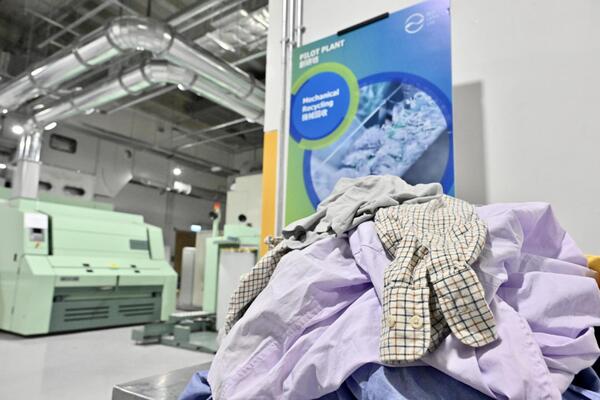Open Lab Boosts Textile Sustainability

With the increasing awareness of environmental protection, people nowadays want to live a greener lifestyle, which makes the sustainable development of the textile and fashion industry that much more of a concern.
In the view of this trend, The Hong Kong Research Institute of Textiles & Apparel (HKRITA) partnered with a non-profit organisation to establish Open Lab, a 20,000 sq ft research and development space. Open Lab aims to develop solutions for the textile, clothing and fashion industry to address climate change by showcasing innovative solutions, providing a collaborative platform and contributing to problem-solving and resource optimisation.
The large space features two primary components, the Fashion Future Lab and the Pilot Plant.
The lab is a modular research space used for focusing on emerging and forward-thinking ideas. Its modular design is beneficial for the development of flexible and adjustable solutions to meet the market’s fast-changing needs.
The HKRITA highlights that the lab serves as a platform for innovations to be developed into scalable applications, ensuring that research outcomes are market-ready.
Eco-friendly production
The first project presented in the Fashion Future Lab is “Farm-to-Garment”, which is a location-independent production line consisting of a hydroponics cotton farming system.
Traditional cotton farming is a soil-based cultivation method which relies on soil to provide nutrients and water to plants. It uses significant amount of water for irrigation. The lab utilises vertical hydroponic techniques, which is a soilless cultivation method where plants are grown in nutrient-rich water solutions.
Nutrients are directly delivered to the plant roots through water. This means that any water that is not absorbed by the plants can be reused, which significantly reduces water consumption, by up to 90%.
In addition, the hydroponic farming method provides controlled environments for continuous cropping. Plus, this type of farm can be located near cities, thus reducing carbon emissions from transportation.
At the same time, the small production line was set up at the lab to showcases its strength at being a one-stop shop for the textile industry.
After the cotton is harvested, it undergoes various processes, such as opening and drawing, to produce yarn for making clothes.
Efficient upcycling
Another key feature of Open Lab is the Pilot Plant, which is an upcycling line featuring a smart garment sorting system for recycling, and the Green Machine 2.0, which separates mixed fibres.
The Hong Kong Research Institute of Textiles & Apparel Director (Business Development) Katherine Chan explained that cotton and polyester blended material is the most commonly used material in textile products.
“So we created Green Machine, using hydrothermal technology, to recover the polyester fibres in textiles. Then, we can do fibre-to-fibre recycling.
“The separated fibres are ready for re-spinning into new yarn products while the cellulose powders, decomposed from the cotton, can be reused for other purposes. As such, it forms a circular production system.”
With the upgraded Green Machine 2.0, the system has the capacity to recycle around a tonne of material daily. The research institute hopes that by demonstrating the feasibility and benefits of circular production, it can inspire and encourage the textiles and apparel industry to adopt similar practices to combat climate change.
Achieving sustainability
Open Lab officially opened in September. The HKRITA described the establishment of the lab as marking a significant milestone in leading the textile and fashion industry toward a more resilient future.
The organisation also stated that Open Lab drives collective efforts and further advancements in sustainable practices across the industry.
MICE Tourism Gains Momentum
Ballroom inspections and mahjong sessions may not be what automatically springs to mind when you consider Hong Kong’... Read more
Game Startups Reach New Level
The global video game industry is highly competitive, requiring effective marketing for success. The Hong Kong Game En... Read more
Breast Milk Donations Save Lives
Last April, Ida Chan welcomed her son into the world. He was born a kilogramme lighter than expected, and Ida decided ... Read more
HK Reaches For The Moon
The beauty and mystery of the Moon have captivated the human imagination for millennia. Channelling that fascination i... Read more
Creating Disability-inclusive Jobs
Nestled in the Museum of the War of Resistance & Coastal Defence, Madam Hong Cafe enjoys the spectacular views of ... Read more
Boosting Conservation Efforts Via AI
Fung Yuen, located in the suburbs of Tai Po and approximately 2km from the town centre, is one of the 12 priority site... Read more

